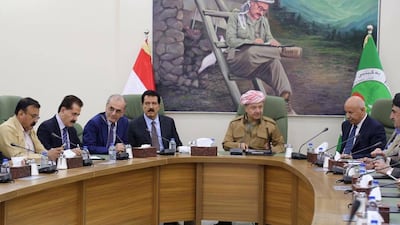Iraq's autonomous Kurdish region says it is willing to hold talks with the central government in Baghdad over a dispute over control of Kurdish airports, border posts and banks in the wake of last month's independence referendum.
Iraq's central government has imposed a ban on international flights to the Kurdish region and threatened to take control of border crossings after Kurds overwhelmingly voted for independence in the September 25 referendum. Last week, the Iraqi central bank stopped selling dollars to four Kurdish-owned banks.
"To avoid this collective punishment, we invite Iraqi prime minister Haider Al Abadi, again, that we [are] ready to any form of dialogue and negotiations in conformity with the Iraqi constitution," the Kurdistan Regional Government (KRG) said a statement published on Thursday morning.
Kurdish officials offered discussions "regarding the crossings, internal trade, providing services to the citizens, the banks and the airports".
The statement appeared to mark a change of tack by Kurdish authorities, coming a day after the KRG security council accused Iraqi government forces and Iranian-trained Iraqi paramilitaries of "preparing a major attack" on Kurdish forces in the oil-rich region of Kirkuk and near Mosul in northern Iraq.
Iraq's prime minister Haider Al Abadi said he would not use the army against the Kurdish region and a military spokesman denied any attack on Kurdish forces was planned, saying government troops were preparing to oust ISIL militants from an area near the Syrian border.
"We won't use our army against our people or to launch a war against our Kurdish citizens," Mr Abadi said in a statement.
"Our duty is to preserve the unity of our country, to implement the constitution, and to protect citizens and national forces," he told a meeting of tribal leaders in the western province of Anbar, where Iraqi security forces are battling to seize the ISIL's last bastion in the country.
Oil-rich Kirkuk has emerged as a flashpoint in the crisis between Baghdad and Erbil, the capital of the Kurdish region, as it is claimed by both sides.
An Iraqi government spokesman outlined a series of pre-conditions for any dialogue, starting with a Kurdish "commitment to Iraq's unity".
The KRG "must accept the sovereign authority of the federal government on oil exports, security and border protection, including land and air entry points."
The Kurdish statement on Thursday also came after an Iraqi court on Wednesday ordered the arrest of three senior Kurdish officials who organised last month's referendum.
Meanwhile on Tuesday, Iraq's central government ordered urgent repairs to a disused pipeline from northern oilfields to a Turkish port, a step that could eliminate Baghdad's need to export crude via the country's Kurdish region and further isolate the independence-seeking Kurds. Turkey and Iran have also threatened to close their borders to oil exports.
Tensions between the KRG and Baghdad have been running high since 2014, when the two sides accused each other of failing to abide by the terms of an oil revenue sharing deal.
Baghdad withheld budget payments to the Kurdistan region in 2014, claiming that the Kurds began selling crude oil independently of the federal government.


